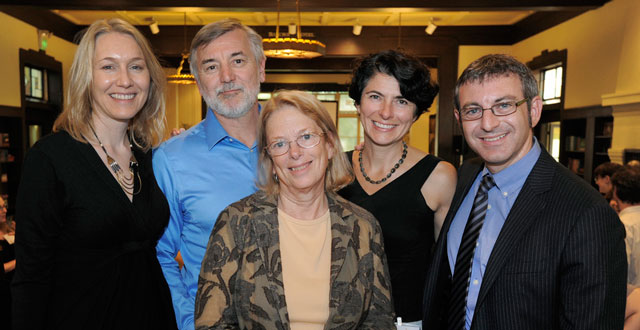
Jennifer Urban ’00, Robert Glushko, Pamela Samuelson, Deirdre Mulligan and Jason Schultz ’00
By Andrew Cohen
At the Samuelson Clinic 10th Anniversary forum earlier this month, co-directors Jennifer Urban ’00 and Jason Schultz ’00 welcomed an overflow crowd of clients, friends, and alumni—more than 120 people who showcased the extent of the clinic’s connections and its impact on technology law and policy.
Several graduates described the clinic’s powerful impact on their professional lives. “As educators who are passionate about what we teach, hearing alumni stories was tremendously rewarding,” Urban said. “It was inspiring to learn about all the great work our former students are doing, how they’re applying what they gained at the clinic, and the positive way they view their practice and policy work.”
Berkeley Law professor Pamela Samuelson and her husband, UC Berkeley School of Information professor Robert Glushko, established the Samuelson Law, Technology & Public Policy Clinic in 2001 with a $2 million gift and have continued to support its work. Under the leadership of Deirdre Mulligan, now also a professor at the School of Information, the clinic opened as the nation’s first of its kind. Today, it provides students with hands-on training while representing the public interest in the fast-changing field of technology law, and has been followed by similar clinics at more than 10 other law schools.
Reflections from clinic clients added to the 10th Anniversary festivities. Public Knowledge, a Washington, D.C.-based public interest group that defends the public’s rights in the emerging digital culture, has worked closely with the Samuelson Clinic on copyright reform and several other projects. Other regular clients include the Electronic Frontier Foundation, Center for Democracy and Technology, Consumers Union, Internet Archive, ACLU of Northern California, and a broad range of other public interest groups and individuals.
“We’ve enjoyed a very close relationship,” said Public Knowledge president and co-founder Gigi Sohn. “I’ve worked with a lot of clinical groups. What sets Samuelson apart is its willingness to delve into policy and get its hands dirty on complicated issues. That may not bring instant gratification, but the effects of such work have strongly influenced long-term results. I go back to this clinic over and over again because it thinks beyond the normal clinical box.”
Mulligan, now a director of the Berkeley Center for Law and Technology, led the clinic for eight years and created its productive framework.
“Professor Mulligan has tremendous vision and energy, and did a phenomenal job marshaling resources and forging effective collaborations,” Urban said. “She understood that being part of a world-class university meant being able to engage other groups to formulate detailed plans that effectively shape policy on key issues.”
The past decade has seen the clinic stockpile an impressive list of achievements.
When companies began using an overbroad provision in the Digital Millennium Copyright Act to seek copyright protection on consumer goods such as garage door opener remotes and printer cartridges, the clinic responded. Students wrote a brief on behalf of Consumers Union explaining the importance of competition to consumers and why the provision in question was not meant to be applied so expansively.
The clinic’s argument proved persuasive to the Federal Circuit and Sixth Circuit Courts of Appeals, as well as the International Trade Commission, all of which ruled that these companies were misconstruing the statute.
“Our students directly engage cutting-edge issues at both the theoretical and practical layers,” Schultz said. “These are key assets when designing social-minded public policy for new and developing technologies.”
Technology transparency and privacy issues have also been successful focal points for the clinic. It has worked to help regulators, the public, and companies understand how to treat new Smart Grid technologies—which can collect information about what is happening within a household.
Companies and others covet such detailed information about personal habits for investigations, demographic targeting, and tailored ads. The clinic’s work over several years, including collaborative research and advocacy, has helped shape how the California Public Utilities Commission and other agencies will ultimately decide to regulate these technologies.
Samuelson Clinic research has also influenced policy on the ethics of legal investigations on social networking sites, book and video privacy, and even poetry. Urban was one of four experts who developed the “Code of Best Practices in Fair Use for Poetry.” Devised for the poetry community, it explains proper uses of copyrighted materials in new and old media and highlights fair use opportunities and limitations to help prevent permissions conflicts.
Former U.S. Poet Laureate Robert Pinsky, who spoke at the 10-year anniversary forum, called it a “stroke of fortune” that Urban served on the same copyright panel as he did, a collaboration that led to him becoming a clinic client with a poetry fair use issue. Pinsky, who praised clinic students and faculty for providing “crisp, high-grade information” and “bridging some toxic waters,” said he had “never experienced better professional help than what I got from the Samuelson Clinic.”